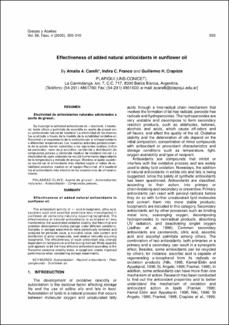El sistema se apagará debido a tareas habituales de mantenimiento. Por favor, guarde su trabajo y desconéctese.
Mostrar el registro sencillo del ítem
Effectiveness of natural antioxidants in sunflower oil
| dc.contributor.author | Carelli, Amalia A. | |
| dc.contributor.author | Franco, Indira C. | |
| dc.contributor.author | Crapiste, Guillermo H. | |
| dc.date.accessioned | 2017-08-16T16:14:04Z | |
| dc.date.accessioned | 2017-08-16T16:14:04Z | |
| dc.date.available | 2017-08-16T16:14:04Z | |
| dc.date.available | 2017-08-16T16:14:04Z | |
| dc.date.issued | 2005-06-27 | |
| dc.date.issued | 2005-06-27 | |
| dc.identifier.uri | http://ridda2.utp.ac.pa/handle/123456789/2819 | |
| dc.identifier.uri | http://ridda2.utp.ac.pa/handle/123456789/2819 | |
| dc.description | The antioxidant activity of ∝- and δ-tocopherol, citric acid, ascorbic acid and ascorbyl palmitate was investigated in sunflower oil containing naturally occurring tocopherol. The effectiveness of natural antioxidants in sunflower oil was monitored by the accelerated oxidative stability test Rancimat and oxidation development during storage under different conditions. Samples in storage experiments were periodically removed and analyzed for peroxide value, p-anisidine value, total content and distribution of polar compounds, and residual naturally occurring tocopherol. The effectiveness of each antioxidant was strongly dependent on temperature and the testing method. While ascorbic acid appears to be the most effective antioxidant according to the Rancimat oxidative stability index, δ-tocopherol shows improved performance when considering storage experiments. | |
| dc.description.abstract | The antioxidant activity of ∝- and δ-tocopherol, citric acid, ascorbic acid and ascorbyl palmitate was investigated in sunflower oil containing naturally occurring tocopherol. The effectiveness of natural antioxidants in sunflower oil was monitored by the accelerated oxidative stability test Rancimat and oxidation development during storage under different conditions. Samples in storage experiments were periodically removed and analyzed for peroxide value, p-anisidine value, total content and distribution of polar compounds, and residual naturally occurring tocopherol. The effectiveness of each antioxidant was strongly dependent on temperature and the testing method. While ascorbic acid appears to be the most effective antioxidant according to the Rancimat oxidative stability index, δ-tocopherol shows improved performance when considering storage experiments. | en_US |
| dc.language | eng | |
| dc.language.iso | eng | en_US |
| dc.rights | https://creativecommons.org/licenses/by-nc-sa/4.0/ | |
| dc.rights | info:eu-repo/semantics/openAccess | |
| dc.subject | Autooxidation | en_US |
| dc.subject | Natural antioxidants | en_US |
| dc.subject | Polar compounds | en_US |
| dc.subject | Sunflower oil | en_US |
| dc.subject | Autooxidation | |
| dc.subject | Natural antioxidants | |
| dc.subject | Polar compounds | |
| dc.subject | Sunflower oil | |
| dc.title | Effectiveness of natural antioxidants in sunflower oil | en_US |
| dc.type | info:eu-repo/semantics/article | |
| dc.type | info:eu-repo/semantics/publishedVersion |
